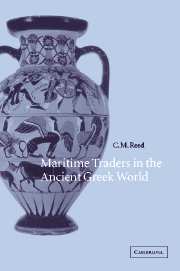Book contents
- Frontmatter
- Contents
- Acknowledgments
- List of abbreviations
- List of references to Greek terms
- Maps
- Introduction
- Chapter 1 Coming to terms
- Chapter 2 Classical modes and patterns of exchange
- Chapter 3 The juridical place of maritime traders
- Chapter 4 The level of wealth of maritime traders
- Chapter 5 Official attitudes towards maritime traders
- Chapter 6 Unofficial attitudes toward maritime traders
- Chapter 7 Archaic modes of exchange and the personnel involved c. 800–475 b.c.
- Chapter 8 Conclusion: then and now
- Appendix 1 Emporoi and nauklēroi: their attested states of origin
- Appendix 2 Cohesion among maritime traders
- Appendix 3 The dikai emporikai
- Appendix 4 Catalogue of emporoi and nauklēroi
- Bibliography
- Index locorum
- General index
Chapter 8 - Conclusion: then and now
Published online by Cambridge University Press: 22 September 2009
- Frontmatter
- Contents
- Acknowledgments
- List of abbreviations
- List of references to Greek terms
- Maps
- Introduction
- Chapter 1 Coming to terms
- Chapter 2 Classical modes and patterns of exchange
- Chapter 3 The juridical place of maritime traders
- Chapter 4 The level of wealth of maritime traders
- Chapter 5 Official attitudes towards maritime traders
- Chapter 6 Unofficial attitudes toward maritime traders
- Chapter 7 Archaic modes of exchange and the personnel involved c. 800–475 b.c.
- Chapter 8 Conclusion: then and now
- Appendix 1 Emporoi and nauklēroi: their attested states of origin
- Appendix 2 Cohesion among maritime traders
- Appendix 3 The dikai emporikai
- Appendix 4 Catalogue of emporoi and nauklēroi
- Bibliography
- Index locorum
- General index
Summary
Certainly, there were those outside the ruling classes or élites of ancient Greece who adhered to alternative ideologies, but as long as politics dominated economics and traditional landed property-owners dominated politics, ‘commercial’ or ‘market’, mentalities or ideologies were not actually going to prevail.
Cartledge (1998: 8)INTRODUCTION
This conclusion differs both in scope and method from the rest of the book. In scope it goes from micro-historical to the macro-level; in method, from the closely empirical to the speculative. Such sea-changes are justified by a particular notion of the role a conclusion should play. The bulk of an empirical historical work should take the reader from knowing less to knowing more about a given subject. The conclusion should ask, “If true, what of it?” “What is the significance of one's findings?” To my mind, questions of significance call for comparisons, the most timely of which is a comparison between then and now, between the place of traders in the world of classical Greece and the place of their various counterparts in the society in which I live.
I live in the southeastern American sunbelt, the fastest growing region in America in wealth and population. In my city professional businesspeople are the wealthiest and most respected element. The nation's largest and fourth-largest banks have their headquarters here, as do 133 interstate trucking firms, a semi-equivalent of ancient maritime trading.
- Type
- Chapter
- Information
- Maritime Traders in the Ancient Greek World , pp. 75 - 81Publisher: Cambridge University PressPrint publication year: 2003



